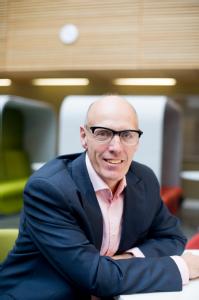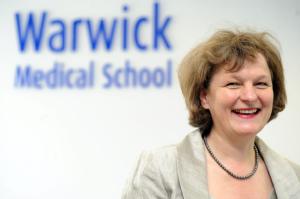New Lord Mayor gives cancer research in Coventry a boost
Cancer research in the region is to receive an extra boost thanks to the new Lord Mayor of Coventry.
Councillor Lindsley Harvard has chosen the University of Warwick’s Cancer Research Centre as one of his two official charities.
The research centre was established to improve detection, treatments and patient care using the expertise of the University’s Warwick Medical School and its partners.
Councillor Harvard announced his choice of charities at the Annual Meeting of the Council of the City of Coventry at the Cathedral on Thursday 19 May. Each year the newly inaugurated Lord Mayor of Coventry announces the charitable organisations they will support during their year in office.
The new Lord Mayor said: “I feel cancer touches the lives of so many people in different forms. This research is vitally important to improve treatment and care and the Centre is working hard to translate these new developments into meaningful improvements in cancer care for patients. Fundraising will be taking place throughout the year and I hope everyone will show their support.”
The University’s Cancer Research Centre brings together expertise from across the city and beyond and works closely with the existing Warwick Clinical Trials Unit and combines elements of cancer clinical trials with clinical sciences at University Hospitals Birmingham (UHB) and University Hospitals Coventry and Warwickshire (UHCW). It brings together the University’s expertise in mathematics, systems biology, medicinal chemistry and biosciences.
Professor Nick James, Director of the Centre said: “We are delighted to receive recognition from the Lord Mayor and the city of Coventry.
“We have numerous on-going research projects and donations made to the Centre will help our researchers detect cancer faster and treat it more effectively.”
The Centre collaborates with the Institute of Digital Healthcare, Warwick Systems Biology Centre, Medicinal Chemistry, Biomedical Cell Biology and Warwick Clinical Trials Unit.
Areas of research for use include the development of more effective anti-cancer drugs and the use of big data to develop personalised cancer therapy. The Centre is also looking at reducing hair loss through a scalp-cooling process which has worked well in small control groups. Researchers are now determining the right temperatures and time-frames to use when the treatment is rolled out across the NHS.
Professor Annie Young said: “In addition to fighting the disease the Centre also looks at some of the issues that cancer patients struggle with on a daily basis during their treatment. 
“A friend of mine discovered she had breast cancer; she was a very successful medic with a great career, lots of support and she understood the implications of the cancer.
“When someone asked her what her biggest fear was, she said ‘losing my hair’. I’m sad to say that she died from breast cancer, but I am determined to do something positive to support the many other women I treat who have a fear of losing their hair during chemotherapy. As well as the tiredness, feeling sick and losing weight they also have to cope with this outward sign of undergoing cancer treatment."
In addition researchers are creating better health education programmes to encourage more people going through cancer therapies to face their fears.
To donate directly to the Cancer Research Centre at the University of Warwick visit www.warwick.ac.uk/cancerappeal
The Institute of Digital Healthcare, based at WMG, University of Warwick is a collaboration between WMG, Warwick Medical School, and the NHS, aiming to improve people’s health and wellbeing by developing innovative digital technologies and services. Through cutting edge R&D and world class postgraduate education, the aim is to improve the quality, safety, accessibility, and productivity of healthcare for clinicians, patients and carers.
23 May 2016
For media enquiries please contact Nicola Jones, Communications Manager, University of Warwick 07920531221 or N.Jones.1@warwick.ac.uk
